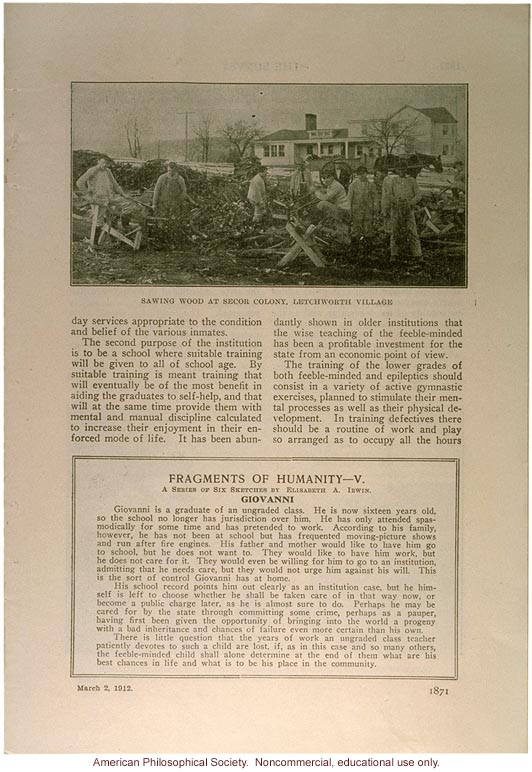"Letchworth Village: the newest state institution for the feeble-minded and epileptic," by Charles Little (2)

"Letchworth Village: the newest state institution for the feeble-minded and epileptic," by Charles Little (2)
361. [photo] Sawing wood at Secor colony, Letchworth village. day services appropriate to the condition and belief of the various inmates. The second purpose of the institution is to be a school where suitable training will be given to all of school age. By suitable training is meant training that will eventually be of the most benefit in aiding the graduates to self-help, and that will at the same time provide them with mental and manual discipline calculated to increase their enjoyment in their enforced mode of life. It has been abundantly shown in older institutions that the wise teaching of the feeble-minded has been a profitable investment for the state from an economic point of view. The training of the lower grades of both feeble-minded and epileptics should consist in a variety of active gymnastic exercises, planned to stimulate their mental processes as well as their physical development. In training defectives there should be a routing of work and play so arranged as to occupy all the hours [boxed type follows] Fragments of Humanity - V. A Series of Six Sketches by Elizabeth A. Irwin. Giovanni Giovanni is a graduate of an ungraded class. He is now sixteen years old, so the school no longer has jurisdiction over him. He has only attended spasmodically for some time and has pretended to work. According to his family, however, he has not been at school but has frequented moving-picture shows and run after fire engines. His father and mother would like to have him go to school, but he does not want to. They would like to have him work, but he does not care for it. They would even be willing for him to go to an institution, admitting that he needs care, but they would not urge him against his will. This is the sort of control Giovanni has at home. His school record points him out clearly as an institution case, but he himself is left to choose whether he shall be taken care of in that way now, or become a public charge later, as he is almost sure to do. Perhaps he may be cared for by the state by committing some crime, perhaps as a pauper, having first been given the opportunity of bringing into the world a progeny with a bad inheritance and chances of failure even more certain than his own. There is little question that the years of work an ungraded class teacher patiently devotes to such a child are lost, if, as in this case and so many others, the feeble-minded child shall alone determine at the end of them what are his best chances in life and what is to be his place in the community. [end boxed type] March 2, 1912. 1871
- ID: 10356
- Source: DNALC.EA


